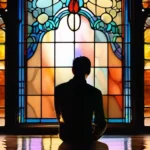Explore the philosophical, psychological, and theological aspects of religious experience as potential evidence for the existence of God.
This article delves into the intriguing question of whether religious experiences can serve as evidence for the existence of a divine being. We will examine various perspectives from philosophy, psychology, and theology to provide a well-rounded understanding of this complex topic.
The Philosophical Perspective: Arguments for God’s Existence
The philosophical perspective on religious experience as evidence for God’s existence has been a cornerstone of theological discourse for centuries. Philosophers have delved into some of the most profound and enduring arguments to explore whether these experiences can serve as reliable indicators of divine presence.
Let’s begin with the Cosmological Argument, often attributed to Aristotle and later popularized by Thomas Aquinas. This argument posits that everything in existence must have a cause, leading back to a prime mover or a first cause – an entity that began it all. Could this initial cause be God? The question is ripe with possibilities; if the universe requires explanation for its origins, isn’t it reasonable to consider a divine creator?
The Teleological Argument, or Design Argument, suggests that complexity and purpose in nature imply design by an intelligent agent. Imagine looking at a watch and concluding there must be a watchmaker – similarly, the intricate workings of the natural world might indicate a designer. But can this argument hold up under scrutiny? Is it possible for complex systems to arise naturally without divine intervention?
The Ontological Argument, famously championed by Anselm and later refined by Descartes and Kant, hinges on the idea that God’s existence as the most perfect being is self-evident. The argument posits that if one can conceive of a perfect being, it must exist because non-existence would make it imperfect. Is this reasoning logically sound? Or does it fail to provide a solid foundation for empirical evidence?
Each of these arguments has its own strengths and weaknesses, but together they offer a rich tapestry of philosophical inquiry into the nature of religious experience. They invite us to ponder whether these experiences might indeed be pointing towards something greater than ourselves – a divine presence that transcends our mortal perceptions.
The Psychological Perspective: Neuroscience and Religious Experience
The Psychological Perspective: Neuroscience and Religious Experience
Imagine peering into the brain during moments of profound religious experience—what would we find? Could these mystical states be nothing more than neural activity, or do they point to something greater?
Recent advances in neuroscience have begun to shed light on the mechanisms behind these transformative experiences. For instance, mystical states often correlate with increased activity in the brain’s reward centers and decreased activity in areas linked to self-awareness. Is this simply a chemical dance within our skulls, or is there something more profound at play?
Near-death experiences (NDEs) also offer intriguing insights. Many report seeing a bright light, feeling a sense of peace, and experiencing the separation between mind and body—a phenomenon often linked to the frontal lobes. Could these experiences be the brain’s way of coping with life-threatening situations?
The question arises: Do these neurological explanations diminish the significance of religious experience? Or could they provide a deeper understanding, revealing the intricate interplay between mind and spirit?
One thing is clear: Religious experiences are complex phenomena that cannot be fully understood through neuroscience alone. Yet, as we continue to explore the brain’s role in these experiences, we may uncover new layers of meaning and insight into our human condition.
So, how do you reconcile these findings with your own religious or spiritual beliefs? Do they challenge or affirm what you think you know about the divine?
The Theological Perspective: Interpreting Religious Experience within Faith Traditions
When exploring religious experience as evidence for the existence of God, one must delve into the rich tapestry of theological perspectives across different faith traditions. From Christian mysticism to Buddhist enlightenment, each tradition offers a unique lens through which to view these experiences.
In Christianity, particularly in mystical traditions like Teresa of Avila and John of the Cross, religious experience is often seen as a direct encounter with God. These saints describe their experiences using metaphors such as ‘the dark night of the soul’ or ‘the narrow way,’ highlighting the transformative nature of these encounters. How can one reconcile these intense spiritual experiences with everyday reality?
In contrast, in Buddhism, religious experience is often viewed more in terms of enlightenment or Nirvana—a state of liberation from suffering and a profound understanding of interdependence. Practices like meditation aim to quiet the mind and allow for a direct realization of the nature of reality. Is it possible that these states are fundamentally different yet equally valid paths to truth?
Judaism, too, has its own traditions of religious experience, with figures such as Moses receiving the Ten Commandments on Mount Sinai. Here, experiences are seen not just as personal but also communal, shaping a people’s understanding and relationship with God over generations.
Each tradition offers a different narrative and interpretation, yet all share a common thread: the profound impact of religious experience on individual and collective life. These varied perspectives challenge us to question our own beliefs and consider the multiple dimensions through which humans seek and encounter the divine.
Do these diverse interpretations mean that one path is superior or that they are simply different ways of walking toward the same truth?
The interpretation of religious experience within faith traditions thus becomes a deeply personal and communal journey, one where each individual must navigate their own beliefs and experiences to find meaning and understanding. As we explore these perspectives, we begin to see that the evidence for God’s existence may lie not just in the experiences themselves but also in how they are interpreted and integrated into our lives.
The Critical Perspective: Challenges and Limitations of Religious Experience as Evidence
The Critical Perspective: Challenges and Limitations of Religious Experience as Evidence
Is religious experience truly reliable evidence for God’s existence? While many find personal spiritual encounters compelling, critics argue that such experiences can be deeply subjective. How can we trust someone’s testimony if their perception is colored by their cultural background or psychological state?
- Cultural Bias: Religious experiences are often shaped by the societal and cultural context in which they occur. Just as a painter’s canvas is influenced by their environment, so too is an individual’s religious experience.
- Psychological Factors: Mental states such as altered consciousness or psychological disorders can lead to profound spiritual experiences. How do we distinguish between a genuine divine encounter and a hallucination?
The problem of evil presents another significant challenge. If God is all-powerful, all-knowing, and all-good, why does evil exist? Religious experiences that promote a positive view of the world might be dismissed as mere wishful thinking or delusion.
Moreover, the diversity of religious experiences across different faiths raises questions about their universality. Are these experiences pointing to one common divine presence, or are they simply reflections of human imagination and longing?
In conclusion, while religious experience offers profound insights into the human condition, it remains a complex and multifaceted phenomenon. The critical perspective encourages us to examine these experiences with both openness and skepticism, recognizing their potential value as well as their limitations.
The Contemporary Debate: Ongoing Discussions and Future Directions
The contemporary debate over whether religious experience can serve as evidence for God’s existence remains a contentious yet fascinating area of exploration. Academics and scholars from various disciplines—philosophy, psychology, theology—are diving into this complex issue, each bringing unique insights to the table.
Philosopher Alexander Pruss argues that religious experiences can indeed be seen as evidence for God’s existence, suggesting they might indicate a personal relationship with a divine being. However, critics like Craig Callender question whether such experiences are reliable or if they could simply be the result of psychological processes gone awry.
Psychologically, researchers have explored how factors such as neurochemical changes and environmental influences can lead to mystical states. For instance, studies suggest that certain neurotransmitters like serotonin play a significant role in these experiences. This raises questions about whether religious experiences are purely spiritual or if they have a biological basis.
Theological discussions also delve into the nature of God and the reliability of human perception. Thomas Aquinas, for example, posited that religious experiences could be seen as an effect of divine causation, though modern theologians debate whether such experiences can provide infallible knowledge about the divine.
The future direction of this research seems promising. Advances in neuroscience might help demystify the physiological underpinnings of these experiences, potentially bridging the gap between subjective reports and objective evidence. Additionally, interdisciplinary approaches that integrate psychology, philosophy, and theology could offer a more comprehensive understanding of religious experience as evidence for God’s existence.
As we move forward, the debate will likely become even richer, with new technologies and methodologies providing deeper insights into the human condition and our quest for meaning beyond the physical world. How these findings shape our understanding of faith and religion remains to be seen, but one thing is certain: the conversation is far from over.
Conclusion: Weighing the Evidence and Reflecting on the Debate
Conclusion: Weighing the Evidence and Reflecting on the Debate
As we reflect on our journey through the complex landscape of religious experience, it becomes clear that this topic is far from resolved. Philosophers, psychologists, and theologians have each brought their unique perspectives to light, painting a picture as intricate and multifaceted as a cathedral’s stained glass window. Can these experiences truly serve as evidence for the God?
From the philosophical standpoint, the question of whether religious experiences can be taken as reliable indicators of divine presence hinges on the validity of our epistemological frameworks. If we accept that subjective experience is a legitimate source of knowledge, then religious experiences could indeed offer profound insights into the nature of existence. However, this acceptance must come with rigorous scrutiny and critical analysis to avoid falling into the trap of confirmation bias.
Psychologically, these experiences can be seen as products of our brain’s intricate mechanisms for processing sensory information and emotional states. Yet, does this mean that they are purely natural phenomena without any transcendent value? The metaphorical garden of neurology might have revealed some of its secrets, but it cannot fully explain the richness of religious experience.
Theological perspectives further complicate the matter by introducing concepts like divine revelation or mystical communion. In these contexts, religious experiences are seen as direct encounters with the divine, providing a form of theophany. This view invites us to consider the metaphysical implications of such experiences, but it also opens up questions about their consistency and universality.
So where does this leave us? The evidence for religious experience as proof of God’s existence remains ambiguous. While each discipline offers valuable insights, none alone can provide a conclusive answer. Perhaps the truth lies in a synthesis of these perspectives—where philosophical rigour, psychological understanding, and theological depth interweave to form a more comprehensive view.
As we continue this dialogue, let us approach it with open minds and hearts, recognizing that the pursuit of knowledge about the divine is as much an art as it is a science. In doing so, we may find ourselves closer not just to answers, but to a deeper appreciation of the mysteries that surround us.
Conclusion
 Upon conclusion, we will summarize the key points discussed in the article and offer insights into the ongoing debate surrounding religious experience as evidence for God’s existence.
Upon conclusion, we will summarize the key points discussed in the article and offer insights into the ongoing debate surrounding religious experience as evidence for God’s existence.











